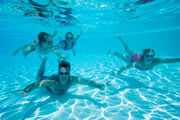Recreational Water Illnesses
On This Page
Recreational Water Illness (noun):
 Illness caused by germs and chemicals found in the water we swim in.
Illness caused by germs and chemicals found in the water we swim in.
Recreational water illnesses (RWIs) are caused by germs and chemicals found in the water we swim in. They are spread by swallowing, breathing in mists or aerosols of, or having contact with contaminated water in swimming pools, hot tubs, water parks, water play areas, interactive fountains, lakes, rivers, or oceans. RWIs can also be caused by chemicals in the water or chemicals that turn into gas in the air and cause air quality problems at indoor aquatic facilities.
Knowing the basic facts about RWIs can make the difference between an enjoyable time at the pool, beach, or waterpark, and getting a rash, having diarrhea, or developing other, potentially serious illnesses.
Facts About Recreational Water Illnesses (RWIs)
What are RWIs?
Recreational water illnesses (RWIs) are caused by germs spread by swallowing, breathing in mists or aerosols of, or having contact with contaminated water in swimming pools, hot tubs, water parks, water play areas, interactive fountains, lakes, rivers, or oceans. RWIs can also be caused by chemicals in the water or chemicals that evaporate from the water and cause indoor air quality problems. RWIs can be a wide variety of infections, including gastrointestinal, skin, ear, respiratory, eye, neurologic and wound infections. The most commonly reported RWI is diarrhea. Diarrheal illnesses can be caused by germs such as Crypto (short for Cryptosporidium), Giardia, Shigella, norovirus, and E. coli O157:H7.
For promotional materials on recreational water illnesses, including brochures, posters, and educational materials, visit the Health Promotion Materials page.
Why should we be interested in RWIs?
Contrary to popular belief, chlorine does not kill all germs instantly. There are germs today that are very tolerant to chlorine and were not known to cause human disease until recently. Once these germs get in the pool, it can take anywhere from minutes to days for chlorine to kill them. Swallowing just a little water that contains these germs can make you sick.
In the past two decades, there has been a substantial increase in the number of RWI outbreaks associated with swimming. Crypto, which can stay alive for days even in well-maintained pools, has become the leading cause of swimming pool-related outbreaks of diarrheal illness. From 2004 to 2008, reported Crypto cases increased over 200% (from 3,411 cases in 2004 to 10,500 cases in 2008) 1.
Although Crypto is tolerant to chlorine, most germs are not. Keeping chlorine at recommended levels is essential to maintain a healthy pool. However, a 2010 study found that 1 in 8 public pool inspections resulted in pools being closed immediately due to serious code violations such as improper chlorine levels 2.
References
- Painter JE, Hlavsa MC, Collier SA, Xiao L, Yoder JS. Cryptosporidiosis Surveillance — United States, 2011–2012. MMWR Surveill Summ. 2015;64(SS-3):1-14.
- CDC. Violations identified from routine swimming pool inspections — Selected states and counties, United States, 2008. MMWR Morb Mortal Wkly Rep. 2010;59(SS19):582-7.
Where are RWIs found?
RWIs are caused by germs spread through contaminated water in swimming pools, water parks, water play areas, hot tubs, decorative water fountains, oceans, lakes, and rivers.
Swimming Pools, Water Parks, Water Play Areas
 The most common RWI is diarrhea. Swallowing even a small amount of water that has been contaminated with feces containing germs can cause diarrheal illness.
The most common RWI is diarrhea. Swallowing even a small amount of water that has been contaminated with feces containing germs can cause diarrheal illness.
To ensure that most germs are killed, check chlorine or other disinfectant levels and pH regularly as part of good pool operation.
For more information, please see the How to Swim Healthy page.
Hot Tubs
 Skin infections like “hot tub rash” are a common RWI spread through hot tubs and spas. Respiratory illnesses are also associated with the use of improperly maintained hot tubs.
Skin infections like “hot tub rash” are a common RWI spread through hot tubs and spas. Respiratory illnesses are also associated with the use of improperly maintained hot tubs.
The high water temperatures in most hot tubs make it hard to maintain the disinfectant levels needed to kill germs. That’s why it’s important to check disinfectant levels in hot tubs even more regularly than in swimming pools.
The germs that cause “hot tub rash” can also be spread in pools that do not have proper disinfectant levels and in natural bodies of water such as oceans, lakes, or rivers.
Decorative Water Fountains
 Not all decorative fountains are chlorinated or filtered. Therefore, when people, especially diaper-aged children, play in the water, they can contaminate the water with fecal matter. Swallowing this contaminated water can then cause diarrheal illness.
Not all decorative fountains are chlorinated or filtered. Therefore, when people, especially diaper-aged children, play in the water, they can contaminate the water with fecal matter. Swallowing this contaminated water can then cause diarrheal illness.
Oceans, Lakes, and Rivers
Oceans, lakes, and rivers can be contaminated with germs from sewage spills, animal waste, water runoff following rainfall, fecal incidents, and germs rinsed off the bottoms of swimmers. It is important to avoid swallowing the water because natural recreational water is not disinfected. Avoid swimming after rainfalls or in areas identified as unsafe by health departments. Contact your state or local health department for water testing results in your area or go to EPA’s beach site.

For more information, please see the Oceans, Lakes, and Rivers page.
For promotional materials on recreational water illnesses, including brochures, posters, and educational materials, please visit the Health Promotion Materials page.
How are RWIs spread?
Diarrheal Illnesses
Swallowing water that has been contaminated with feces containing germs can cause diarrheal illness.
Swimmers share the water—and the germs in it—with every person who enters the pool. On average, people have about 0.14 grams of feces on their bottoms 1 which, when rinsed off, can contaminate recreational water. In addition, when someone is ill with diarrhea, their stool can contain millions of germs. This means that just one person with diarrhea can easily contaminate the water in a large pool or water park. Swallowing even a small amount of recreational water that has been contaminated with feces containing germs can make you sick. Remember, chlorine does not kill germs instantly, and some germs, such as Cryptosporidium (or “Crypto”), are extremely chlorine tolerant.
In addition, lakes, rivers, and the ocean can be contaminated with germs from sewage spills, animal waste, and water runoff following rainfall. Some common germs can also live for long periods of time in salt water.
Other RWIs
Many other RWIs (skin, ear, eye, respiratory, neurologic, wound, and other infections) are caused by germs that live naturally in the environment (for example, in water and soil). If disinfectant levels in pools or hot tubs are not maintained at the appropriate levels, these germs can multiply and cause illness when swimmers breathe in mists or aerosols of or have contact with the contaminated water.
For promotional materials on recreational water illnesses, including brochures, posters, and educational materials, please visit the Health Promotion Materials page.
Reference
- Gerba, CP. 2001. Assessment of Enteric Pathogen Shedding by Bathers during Recreational Activity and its Impact on Water Quality. Quant Microbiol. 2:55-68.
Why doesn't chlorine kill RWI germs?
 Chlorine (in swimming pools and hot tubs) kills the germs that cause RWIs, but the time it takes to kill each germ varies.
Chlorine (in swimming pools and hot tubs) kills the germs that cause RWIs, but the time it takes to kill each germ varies.
In pools and hot tubs with the correct pH and disinfectant levels, chlorine will kill most germs that cause RWIs in less than an hour. However, chlorine takes longer to kill some germs, such as Crypto (short for Cryptosporidium). Crypto can survive for days even in a properly disinfected pool. This is why it is so important for swimmers to keep germs out of the water in the first place.
To protect yourself, your family, and other swimmers from RWIs, it is essential to learn and practice the steps of healthy swimming.
For promotional materials on recreational water illnesses, including brochures, posters, and educational materials, please visit Healthy Swimming’s Health Promotion Materials page.
Who is most likely to get ill from an RWI?
 Children, pregnant women, and people with weakened immune systems (for example, people living with AIDS, individuals who have received an organ transplant, or people receiving certain types of chemotherapy) can suffer from more severe illness if infected. People with weakened immune systems should be aware that recreational water might be contaminated with human or animal feces containing Crypto (short for Cryptosporidium). Crypto can cause a life-threatening infection in persons with weakened immune systems.
Children, pregnant women, and people with weakened immune systems (for example, people living with AIDS, individuals who have received an organ transplant, or people receiving certain types of chemotherapy) can suffer from more severe illness if infected. People with weakened immune systems should be aware that recreational water might be contaminated with human or animal feces containing Crypto (short for Cryptosporidium). Crypto can cause a life-threatening infection in persons with weakened immune systems.
People with a weakened immune system should consult their healthcare provider before participating in activities that place them at risk for illness.
See also:
- Cryptosporidium
- Cryptosporidiosis Prevention for Immunocompromised Persons
- CDC. Guidelines for prevention and treatment of opportunistic infections in HIV-infected adults and adolescents. MMWR Morb Mortal Wkly Rep. 2009;58(RR04):1-198.
For promotional materials on recreational water illnesses, including brochures, posters, and educational materials, please visit the Health Promotion Materials page.
How can we prevent RWIs?
There are a few easy and effective healthy swimming steps all swimmers can take each time we swim to help protect ourselves, our families, and our friends from RWIs. Visit the Steps of Healthy Swimming page to learn more.
What are the top causes of all RWI outbreaks?
Top 10 Causes:*
- Cryptosporidium
- Pseudomonas
- Shigella
- Legionella
- Norovirus
- E. coli
- Giardia
- Disinfection agents & their byproducts (chlorine, bromine, hydrochloric acid)
- Avian schistosomes
- Leptospira
For a complete listing of water-related surveillance data, see CDC’s Surveillance Reports for Recreational Water-associated Disease & Outbreaks.
*1978-2010; Ordered from highest to lowest frequency (i.e., #1 is the most-commonly reported etiology). Only confirmed etiologies in source databases have been included the analyses. For outbreaks with multiple etiologies, each etiologic agent counted towards the total.
Specific RWI Infections
RWIs include a wide variety of infections. Learn in more detail about these infections on the following pages.
- Page last reviewed: January 25, 2017
- Page last updated: January 25, 2017
- Content source:


 ShareCompartir
ShareCompartir